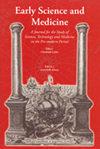From New Spain to Damascus: Ottoman Religious Authorities and the Making of Medical Knowledge on Tobacco
IF 0.5
2区 哲学
Q3 HISTORY & PHILOSOPHY OF SCIENCE
引用次数: 0
Abstract
This article examines the translation, circulation, and adaptation of the medical opinion of Spanish physician Nicolas Monardes (d. 1588) on tobacco in the Ottoman Empire. In addition to medical and encyclopedist authors, the spread of new medical knowledge in learned and eventually popular registers was the result of the efforts of religious authorities. These latter authorities, namely jurists, Sufis, and preachers, took an interest in the bodily and mental effects of smoking for its moral implications. In forming their medical-moral discourse, they sought and studied contemporary medical works of both Ottoman and European provenance. Challenging the strict division between learned and popular medicine, this article argues that Ottoman religious authorities, while often excluded from the history of medicine, played significant roles in the circulation, adaptation, and localization of medical knowledge.从新西班牙到大马士革:奥斯曼宗教权威和烟草医学知识的形成
本文考察了西班牙医生Nicolas Monardes(1588年)关于烟草的医学意见在奥斯曼帝国的翻译、传播和改编。除了医学和百科全书的作者之外,新的医学知识在学术和最终流行的登记册上的传播是宗教当局努力的结果。这些后一种权威,即法学家、苏菲派和传教士,对吸烟对身体和精神的影响感兴趣,因为它具有道德含义。在形成他们的医学道德话语时,他们寻求并研究了奥斯曼和欧洲的当代医学著作。这篇文章挑战了学术医学和大众医学之间的严格划分,认为奥斯曼宗教当局虽然经常被排除在医学史之外,但在医学知识的流通、适应和本地化方面发挥了重要作用。
本文章由计算机程序翻译,如有差异,请以英文原文为准。
求助全文
约1分钟内获得全文
求助全文
来源期刊

Early Science and Medicine
HISTORY & PHILOSOPHY OF SCIENCE-
CiteScore
0.50
自引率
0.00%
发文量
22
审稿时长
>12 weeks
期刊介绍:
Early Science and Medicine (ESM) is a peer-reviewed international journal dedicated to the history of science, medicine and technology from the earliest times through to the end of the eighteenth century. The need to treat in a single journal all aspects of scientific activity and thought to the eighteenth century is due to two factors: to the continued importance of ancient sources throughout the Middle Ages and the early modern period, and to the comparably low degree of specialization and the high degree of disciplinary interdependence characterizing the period before the professionalization of science.
 求助内容:
求助内容: 应助结果提醒方式:
应助结果提醒方式:


